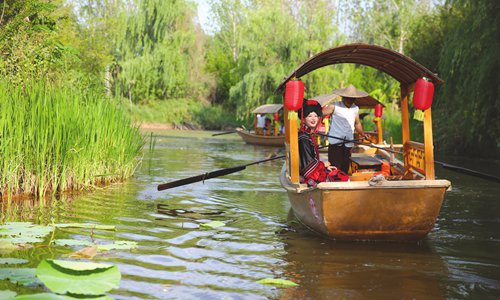Daliangshan theater festival aims to become drama king of China’s mountainous southwest region

Promotional material for the Daliangshan International Theater Festival in Xichang, Southwest China's Sichuan Province Photo: Courtesy of the Daliangshan International Theater Festival
Standing on bamboo rafts, a man and woman dressed in the traditional clothing of the Yi ethnic group sing to each other from across the water. The boats, carrying an amazed audience, slowly floated across the water, passing by two dancers performing the traditional Korean talchum mask dance on a small island. Next, the boat passed by two young women dressed in ancient Greek clothing braiding each other's hair by the water. By their side stood an athletic young man dressed as Dionysus, the ancient Greek god of wine and theater.
Event on the water
The series of performances were held on Wednesday at a wetland reserve in Xichang, Southwest China's Sichuan Province, as part of a press event for the Dalianshan International Theater Festival, which will kick off on November 19.
Aside from famous Chinese theater actors, directors and artists, international theater directors such as France's Jean Lambert-Wild, the US' Michael Leibenluft and Japan's Nakashima Makoto number among the 20 founders of the festival.
Several events were spread throughout the day on Wednesday. In addition to the founders and organizers speaking to the media, guests were invited to take a boat tour through the wetlands, where various theatrical performances were being held. When evening fell, a magnificent performance featuring the rich ethnic cultures of the region was held at a gala, where the 38 plays that will be performed during the festival were announced.
The Chinese version of Requiem is one of the highlights among the plays announced. Performed by Israel's Cameri Theatre troupe, Requiem was greatly received by Chinese audiences during its previous four performances in China. Other plays include Chinese classics such as Synopsis of the Prince of Lanling, Three Comedies by Ding Xilin and Yi Hong, an original opera about the Yi people living in the mountainous Daliangshan region.
Standing on its own
Speaking of theater festivals in China, the Wuzhen Theater Festival is probably the first to come to the minds of Chinese theatergoers. Wuzhen, a historical water town in Tongxiang, East China's Zhejiang Province, has been hosting the annual festival since 2013.
Over the past six years, the number of international troupes to perform at the festival has been growing. In 2018, among the 29 plays at the festival, 16 were international productions, four times the amount held in 2013.
The festival attracts theater enthusiasts from across China, who are willing to pay high prices to see the best theater performances (some tickets cost over $125). In addition to its lineup of shows, Chen Tian, an associate professor of the Department of Theater, Film and Television at Nanjing University, attributed its success to Wuzhen's local tourism resources, China's large population and dearth of prominent theater festivals.
Can the Daliangshan International Festival rise to share the spotlight with the Wuzhen Theater Festival, becoming a major international theater festival in Southwest China?
Veteran theatrical actor Pu Cunxin, currently chairman of the China Theatre Association and one of the founders of the Daliangshan festival, did not appear interested in comparing the festival to its counterpart in the eastern part of China.
"We just started it. It's still developing... We can only take one step at a time. Speaking from a macro perspective, the western region of China should have a major theater festival, and Daliangshan has the capacity to do this," Pu told the Global Times.
A common language
Xichang is the capital of the Liangshan Yi Autonomous Prefecture, where the Daliangshan mountain range is located. The region is known for its untouched natural scenery and diverse ethnic cultures, which contribute to the theatrical charm of the place and inspire artists to create. Leibenluft, an Obie Award-winning theater director, said at the presser that this was his fourth trip to Daliangshan. His first trip was in 2015, when he collaborated with Chinese playwright and director Li Ting on the multilingual folk musical Flood in the Valley.
"During the collaboration, we shared many stories with each other, stories about families and countries. I found theater to be a precious platform for artists from different countries to communicate on a deep level," he said, looking back at the experience.
"We [the US and Chinese crew] didn't know each other's language, the best way for us to communicate when working together turned out to be theater itself," he added.
Chinese director Zhao Miao further pointed out that the Daliangshan International Theater Festival will be able to provide a platform for drama students and theater professionals to watch authentic traditional and original ethnic dramas, as well as singing and dancing performances in China.
"We have many young theater professionals, who care about the development of theater in various cities as well as among different ethnic groups. They belong to China, and we hope to infuse these cultural elements with a modern expression and introduce them to the world," said Zhao.
Newspaper headline: Aiming for the top